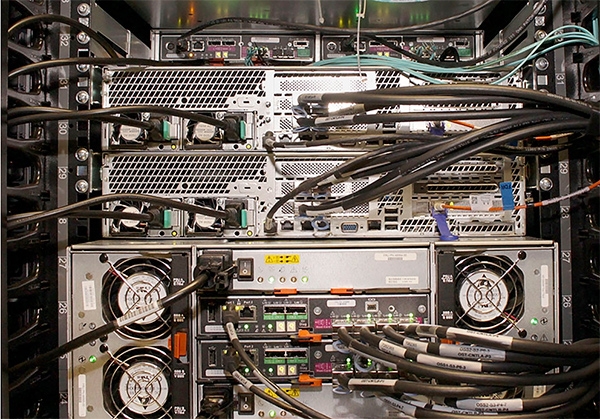

Funded by FAPESP, the supercomputer can be used not only by researchers at the center where it is installed but also by other researchers affiliated with other universities and research institutions throughout São Paulo State (photo: CeMEAI)
Euler high-performance science data processing system is the fastest-ever computer installed in a university in São Paulo State
Euler high-performance science data processing system is the fastest-ever computer installed in a university in São Paulo State

Funded by FAPESP, the supercomputer can be used not only by researchers at the center where it is installed but also by other researchers affiliated with other universities and research institutions throughout São Paulo State (photo: CeMEAI)
By Elton Alisson in São Carlos | Agência FAPESP – A groundbreaking high-performance science data processing system called Euler was unveiled on July 14 at the São Carlos campus of the University of São Paulo (USP), in the interior of the state. The computer cluster belongs to the Center for Research, Innovation & Diffusion in Mathematical Sciences Applied to Industry (CeMEAI), one of the Research, Innovation & Diffusion Centers (RIDCs) supported by FAPESP.
Acquired at a cost of R$4.5 million (now about US$1.4 million), Euler is the fastest computer system installed in São Paulo State’s universities, according to the project’s coordinators.
“The cluster was installed in January and went live in March. Since then, it’s been used by several researchers for projects that require high-performance computing,” said José Alberto Cuminato, a professor at the USP São Carlos Mathematical Sciences & Computing Institute (ICMC) and the director of CeMEAI.
Named for the Swiss mathematician and physicist Leonhard Paul Euler (1707-83), who contributed to scientific progress in several fields, such as number theory, applied mathematical analysis and fluid mechanics, the cluster consists of 104 computers linked to each other by a high-speed network. Each computer has two processors with 20 cores.
Whereas an ordinary laptop computer can perform 10 billion basic mathematical operations (such as addition, subtraction, multiplication and division) every second – known as floating-point operations per second, or flops – Euler is capable of 47 trillion flops.
“Euler is suitable for applications that require parallel processing, or using many processors simultaneously, such as simulating flows of oil or other fluids, as well as aerodynamics, weather forecasting, and Big Data processing,” said Fabrício Simeoni de Sousa, a professor at ICMC and the staffer responsible for the computer cluster.
Installed in a hosting room of the Information Technology Center (CETI) on USP’s São Carlos campus, Euler is already being used by researchers affiliated with universities and research institutions in São Paulo State.
A group of researchers at ICMC is using the supercomputer for oil refining and combustion simulations in partnership with Petrobras.
Another group of researchers affiliated with the Institute of Advanced Studies (IEA) at the Aerospace Technology General Command (CTA) has used Euler for aerodynamics simulations, including preparations for SARA, the Brazilian suborbital mission scheduled to launch later this year.
“An aerodynamics simulation used to take 150 days. Now, we can process this kind of operation in 20 days, thanks to the supercomputer,” said Carlo Junqueira-Junior, a PhD student at IEA.
Euler is funded by FAPESP’s Multi-User Equipment Program, so it can be used not just by researchers at CeMEAI but also by other researchers affiliated with universities and research institutions throughout São Paulo State.
“FAPESP has funded several computer clusters at universities and research institutions in the state,” said Carlos Henrique de Brito Cruz, FAPESP’s Scientific Director.
“The challenge for institutions that receive funding to acquire multi-user equipment is facilitating access for all interested researchers affiliated with the state’s universities and research institutions.”
Upgrade
In the next two years, CeMEAI’s computer cluster will be upgraded to increase the number of processors.
The upgrade will make Euler the fastest supercomputer installed in any Brazilian university and possibly one of the top 500 supercomputers in operation worldwide.
“The fastest computer system installed in a Brazilian university at present is the Rio de Janeiro Federal University’s High-Performance Computer Center [NACAD-UFRJ],” Sousa said.
Brazil’s largest supercomputer, according to Sousa, will be installed in September at the National Scientific Computing Laboratory (LNCC), which is part of the National High-Performance Processing System (SINAPAD), and will cost R$60 million (about US$18.8 million).
For more information about the Euler supercomputer, visit www.cemeai.icmc.usp.br.
Republish
The Agency FAPESP licenses news via Creative Commons (CC-BY-NC-ND) so that they can be republished free of charge and in a simple way by other digital or printed vehicles. Agência FAPESP must be credited as the source of the content being republished and the name of the reporter (if any) must be attributed. Using the HMTL button below allows compliance with these rules, detailed in Digital Republishing Policy FAPESP.





